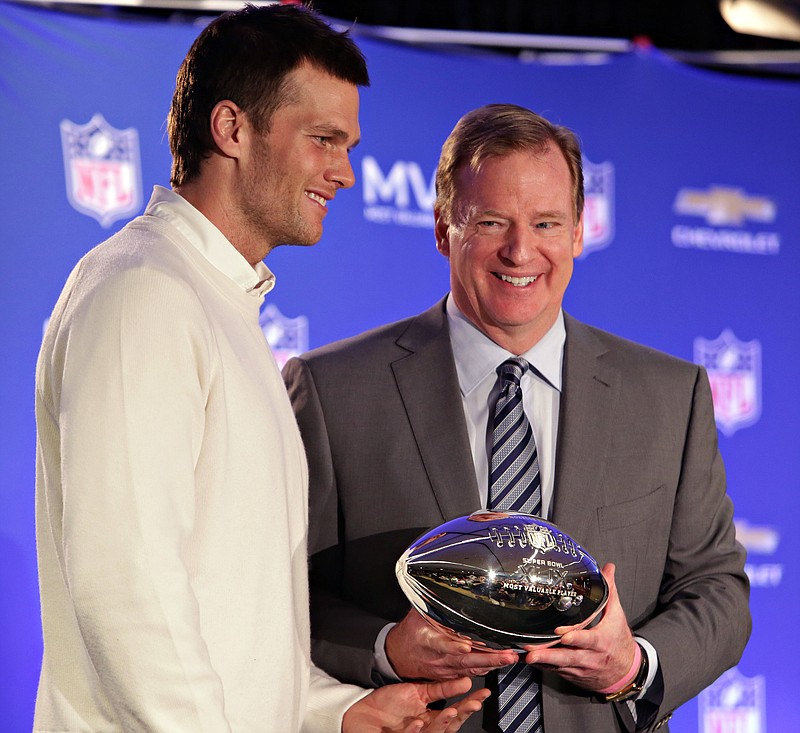Read more
What's next for Brady, Patriots after 'Deflategate' report
The National Football League on Wednesday reported that the footballs used in January's AFC Championship game almost certainly were deliberately deflated to give New England Patriots quarterback Tom Brady a winning advantage against the Seattle Seahawks and "it is more probable than not" that Brady was "at least generally aware of the inappropriate activities" of locker room attendant Jim McNally and equipment assistant John Jastremski.
The 243-page report and appendix also notes that Brady refused to turn over personal information like texts and emails. Furthermore, the report cast doubt on the quarterback's claim that he didn't know the name of McNally, the Patriots 32-year seasonal and part-time employee who investigators think most likely improperly deflated footballs just before the teams faced off. The Patriots won 45-7 and advanced to play and win the Super Bowl.
Brady's agent has called the NFL report flawed, biased and "a terrible disappointment."
The report is a disappointment. It clearly shows that cheating is alive and well -- still -- in national sports. The lessons of other greats who cheated -- Lance Armstrong, for instance -- have not sunk in.
What it doesn't do is answer the Howard Baker/Watergate-like question: What did the quarterback know and when did he know it? Without that definition, this report impugns Brady, but doesn't score.
That's not necessarily true, however, for the team employees.
Video shows McNally carrying the game balls to a bathroom after a referee had checked them. The referee had found all but two balls properly inflated, and he adjusted those two to the proper measure. McNally stayed in the bathroom for one minute and 40 seconds, then emerged and carried the balls onto the field. The referee later noted that for the first time in his 19 years on the job, he couldn't locate the game balls before leaving the Officials' Locker Room. That's because McNally had already left with them.
Then there are the texts from the previous weeks and months between McNally and Jastremski. Those texts clearly show there were conversations between Jastremski and Brady about the inflation of game balls. In a number of the text messages, McNally and Jastremski discussed the air pressure of Patriots' game balls, Brady's unhappiness with the inflation levels of those balls and Jastremski's plan to provide McNally with a "needle" (a device to inflate or deflate a ball) as well as cash and other things of value like sneakers and autographed items.
Later, NFL consultants simulated game conditions to see if the balls might have deflated on their own. The answer was no. They also simulated the time needed to deflate the balls in the bathroom. The answer was it could be done in well under one minute and 40 seconds. Furthermore, in one communication, McNally referred to himself as the "deflator" and stated he was "not going to espn ... yet."
Page 127 of the report reads: "Additional evidence of Brady's awareness includes a material increase in the frequency of telephone and text communications between Brady and Jastremski shortly after suspicions of ball tampering became public on January 19 suggests that Brady was closely monitoring Jastremski."
After not communicating by telephone or text for more than six months (according to data retrieved from Jastremski's cell phone), Brady and Jastremski spoke twice by telephone on Jan. 19 for just over 25 minutes and twice on Jan. 20 for almost 10 minutes, then twice more on Jan. 21 for nearly 21 minutes. Jastremski surrendered his phone to the Patriots later that day.
According to the report: "Brady also took the unprecedented step of inviting Jastremski to the QB room in Gillette Stadium on January 19 for the first and only time that Jastremski can recall during his twenty-year career with the Patriots ..."
Yes, all of that is pretty suggestive. But we fans and parents of young fans and ordinary Americans honed to respect these athletes are owed more than suggestive.
NFL Commissioner Roger Goodell has said Troy Vincent, the league's executive vice president of football operations, will decide on possible penalties and if the game-day process for delivering footballs to the field needs to be changed.
What really seems to be "more probable than not" is that this report stops short of being finished -- and definitive.
Either Brady, et al, are cheaters or they aren't. Why wasn't Brady required to furnish his cell phone data? Why were the Patriots allowed to refuse to bring McNally forward for follow-up interviews?
Does it really matter in the scheme of world drama whether the Patriots cheated their way to a championship or not?
Yes, it does.
Millions of young boys and girls idolize these big deal sports figures. When questions are raised about cheating, we need to really get to the answer, not just to another report that gives us "probable" conversation.
